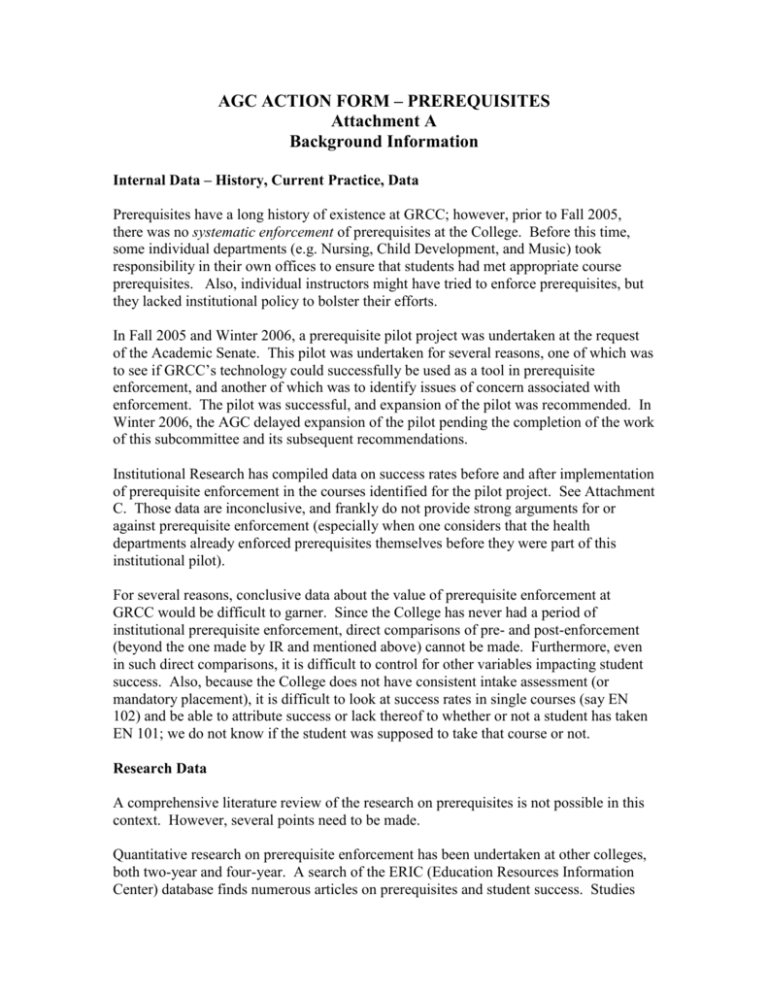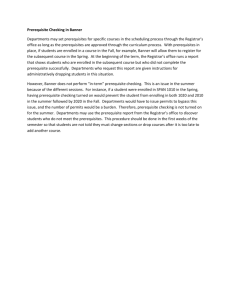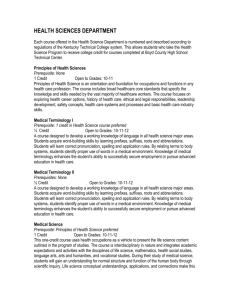AGC ACTION FORM – PREREQUISITES Attachment A Background
advertisement

AGC ACTION FORM – PREREQUISITES Attachment A Background Information Internal Data – History, Current Practice, Data Prerequisites have a long history of existence at GRCC; however, prior to Fall 2005, there was no systematic enforcement of prerequisites at the College. Before this time, some individual departments (e.g. Nursing, Child Development, and Music) took responsibility in their own offices to ensure that students had met appropriate course prerequisites. Also, individual instructors might have tried to enforce prerequisites, but they lacked institutional policy to bolster their efforts. In Fall 2005 and Winter 2006, a prerequisite pilot project was undertaken at the request of the Academic Senate. This pilot was undertaken for several reasons, one of which was to see if GRCC’s technology could successfully be used as a tool in prerequisite enforcement, and another of which was to identify issues of concern associated with enforcement. The pilot was successful, and expansion of the pilot was recommended. In Winter 2006, the AGC delayed expansion of the pilot pending the completion of the work of this subcommittee and its subsequent recommendations. Institutional Research has compiled data on success rates before and after implementation of prerequisite enforcement in the courses identified for the pilot project. See Attachment C. Those data are inconclusive, and frankly do not provide strong arguments for or against prerequisite enforcement (especially when one considers that the health departments already enforced prerequisites themselves before they were part of this institutional pilot). For several reasons, conclusive data about the value of prerequisite enforcement at GRCC would be difficult to garner. Since the College has never had a period of institutional prerequisite enforcement, direct comparisons of pre- and post-enforcement (beyond the one made by IR and mentioned above) cannot be made. Furthermore, even in such direct comparisons, it is difficult to control for other variables impacting student success. Also, because the College does not have consistent intake assessment (or mandatory placement), it is difficult to look at success rates in single courses (say EN 102) and be able to attribute success or lack thereof to whether or not a student has taken EN 101; we do not know if the student was supposed to take that course or not. Research Data A comprehensive literature review of the research on prerequisites is not possible in this context. However, several points need to be made. Quantitative research on prerequisite enforcement has been undertaken at other colleges, both two-year and four-year. A search of the ERIC (Education Resources Information Center) database finds numerous articles on prerequisites and student success. Studies that clearly link prerequisite enforcement with increased student success have been undertaken, for example, at Muskegon Community College (ERIC EJ536331) and the San Jose/Evergreen Community College District in California (ERIC ED354978). Scholarship by nationally recognized educators clearly supports prerequisite enforcement, and, even more strongly, its closely related counterparts, mandatory intake assessment and placement. For example, Hunter Boylan, Head of the National Center for Developmental Education at Appalachian State University, considers mandatory assessment and placement to be two of the essential components of a successful developmental education program and cites research to support his assertion that mandatory assessment and placement clearly correlate to student success (What Works: Research-Based Practices in Developmental Education 35-38). Mandatory placement does not differ in nature from prerequisite enforcement. Edward Morante, noted statistician and assessment scholar, and former Director of the New Jersey Department of Higher Education, has famously written: “Placement must be mandatory since it borders on the unethical to know that a student lacks basic skills but is still allowed to enroll in college courses requiring that skill” (“Selecting Tests and Placing Students,” Journal of Developmental Education, vol. 13, no. 2, 1989, p. 2). Finally, in High Stakes, High Performance: Making Remedial Education Work, John E. and Suanne D. Roueche, prolific authors on community college education issues, and leaders in the Community College Leadership Program at the University of Texas at Austin, write: “Universities do not hesitate to prohibit students from enrolling in courses for which they are not prepared or have not completed prerequisites; community colleges should do no less” (30). Benchmarking Data Michigan Community Colleges that enforce prerequisites At the January 27, 2006 meeting of the Michigan Community College Registrars, Howard Shanken conducted a survey of all colleges present. 17 out of the 20 Michigan community colleges in attendance enforce prerequisites. GRCC is included as one of the 3 schools that do not enforce prerequisites. Other large institutions, such as Macomb and Lansing, are among the 17 schools that do. League for Innovation Vanguard Learning Colleges that enforce prerequisites For this recommendation, Laurie Chesley researched (consulted websites and made phone calls) whether or not the 12 Vanguard Learning Colleges enforce prerequisites. All 12 enforce prerequisites. These institutions include Cascadia Community College, the Community College of Baltimore County, the Community College of Denver, Humber College, Kirkwood Community College, Lane Community College, Madison Area Technical College, Palomar College, Moraine Valley Community College, Richland College, Sinclair Community College, and Valencia Community College. 2





